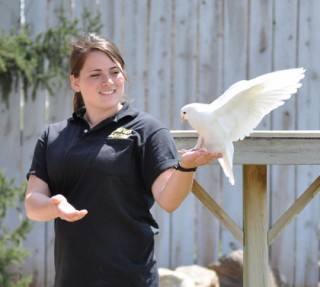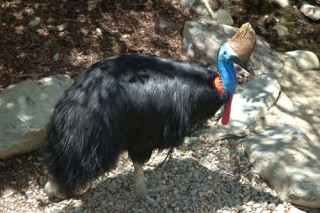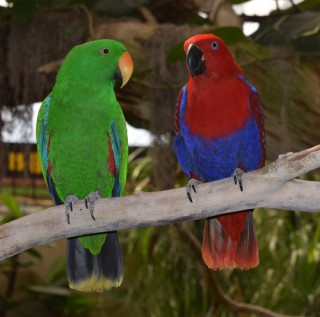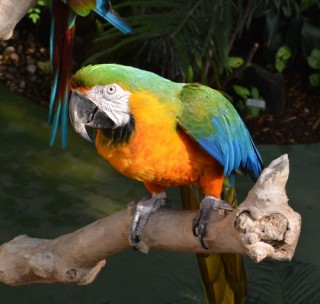Do They Mate For Life?
When our parrots and owls are on their walks through the park, curious Guests often ask "Do they mate for life?" I always say "Well... sort of." There is rarely enough time to delve into the sordid details of avian love, but with Valentine's Day approaching, I thought I'd give it a try!
 Birds, a bit more than other animal groups, have a reputation for being faithful partners. Doves can be found in religious texts as symbols of innocence and fidelity, there are many accounts of the same bird couple returning to the same nest site year after year, and we have even named some of them "lovebirds."
Birds, a bit more than other animal groups, have a reputation for being faithful partners. Doves can be found in religious texts as symbols of innocence and fidelity, there are many accounts of the same bird couple returning to the same nest site year after year, and we have even named some of them "lovebirds."Well, the truth is, love is a many-splendored thing, and monogamy is more complex in the bird world than we used to think.
Monogamy is the term used when one bird pairs with one other bird for the long term. But it isn't the only option. Our state bird, the Ring-necked Pheasant, is one of the species that utilizes polygyny — one male mates with multiple females. The brilliantly colored male often travels with his group of females to defend them from rivals during the breeding season. However, he has little to do with caring for the chicks. The flip side of the coin is polyandry, one female mating with multiple males. This is a bit rarer, but not unheard of — the cassowaries, jacanas, and phalaropes are among those species where the females mate with multiple males. A lady phalarope will lay a clutch of eggs for the father to care for, and then leave to look for more partners.
In fact, there isn't even one form of monogamy. Some birds bond with a single partner, but only for as long as a single breeding season lasts — this seems to be the case with the Northern Cardinal and Black-capped Chickadee. Many songbirds have what is called "social monogamy," where the male and female only consort socially with one partner. But if you did a genetic test on their hatchlings, you might find some oddballs! These are the lovechildren of quick trysts outside of the pair bond. "Genetic monogamy," where a pair of birds is socially bonded and sexually exclusive, is much rarer. Finally, even the most faithful of birds can hit a rough patch, and yes, get divorced.
You can hardly blame past scientists for assuming the birds they saw devotedly preening each other were monogamous. Who can keep eyes on a bird 24/7 in impassable jungle? It was only with the development of genetic testing that we began to realize just how rare monogamy actually was.
Why stay together at all? Monogamy seems to be favored in species with comparatively long lifespans, slow reproductive rates, and needy babies (Emperor Penguins, Bald Eagles, Greater Flamingos, Military Macaws etc). Chances of chick survival in these species are often much better with two parents around to provide care.
Yet even in these groups, cheating and divorce can occur. And their cousins may thrive with a completely different system. A Military Macaw like our Bubba may never stray from his girl, but across the world, his little green cousin the Eclectus parrot is bringing a delicious treat to his red-and-blue lady huddled in her tree cavity... then flying a ways to give another treat to his other lady... whilst a different male brings tidbits to the female he just left! On rare occasions, Bubba's neighbors might not even get the species right, resulting in hybrids like our Catalina Macaw, Nazca.
It may seem like science has exposed bird relations as a messy soap opera, but for me, it highlights something nature cherishes most: diversity. Diverse strategies and genes improve the chance of surviving the many challenges of life on Earth.
If you are spending Valentine's Day with your sweetheart, enjoy yourselves! If you are not, try searching for videos of grebes doing their mating dance. It will make you smile, and maybe you could get a few pointers.
Julia Kittelson, Curator of Birds








